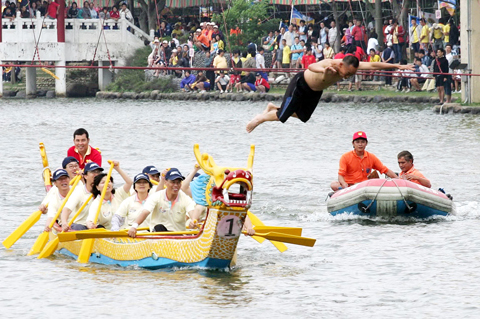While hundreds of thousands of travelers hit the road on the first day of the Dragon Boat Festival holiday yesterday, Taipei Railway Station and Songshan Airport were also packed with holidaymakers.
While traffic congestion was reported at 6pm on the southbound lanes of Freeway No. 5 near the Hsuehshan Tunnel, traffic on other freeways was relatively smooth.
Taiwan Area National Freeway Bureau traffic management division chief Kang Jyh-fu (康志福) said 360,000 vehicles traveled on the nation’s freeways between midnight and 7am yesterday, the bureau’s designated toll-free hours for this year’s Dragon Boat Festival holiday. The number was about 2.4 times the average weekend traffic volume.

PHOTO: SHEN CHI-CHANG, TAIPEI TIMES
The bureau estimated that traffic will be heavy today from 8am to 1pm on the southbound lanes from Taoyuan to Jhongli (中壢) on Freeway No. 1, from Yingge (鶯歌) to Dasi (大溪) on Freeway No. 3 as well as on the southbound lanes on Freeway No. 5.
Motorists are advised to check for updated traffic reports on the bureau’s Web site at www.freeway.gov.tw.
Taipei Railway Station was filled with travelers eager to return to their hometowns yesterday. Many of the trains heading to the south or east were packed.
Taipei Songshan Airport was also busy yesterday. The Civil Aeronautics Administration asked UNI Air (立榮航空) and TransAsia Airways (復興航空) to add extra flights to Kinmen and Makung last night to accommodate a large number of passengers who had been placed on waiting lists.
With an eye on the long weekend, the Environmental Protection Administration (EPA) had conducted its water quality inspections this year of 12 of the nation’s most popular swimming spots.
The survey placed all 12 in the EPA’s “superior” category in terms of water quality.
The results represent a drastic improvement from last year’s beach water quality checks. An inspection of 10 destinations in June last year placed just one beach — Taipei County’s New Jinshan Bathing Beach (新金山) — in the “superior” category, while four had “good” water quality, two were ranked as average and three were rated as not suitable for swimming.
“On May 24 and 25 we inspected 10 popular beaches in Taiwan proper, and found all to have superior water quality suitable for swimming,” said Chu Yu-chi (朱雨其), director-general of the EPA’s department of environmental monitoring and information management.
Water quality at beaches is defined by the amount of E. coli bacteria in the water, Chu said.
“Those with E. coli concentrations of less than 1,000 colony-forming units (CFU) are defined as suitable for swimming,’” he said.
Besides New Jinshan, the beaches inspected this year include Baishawan (白沙灣) and Fulong (福隆) in Taipei County, Tunghsiao (通霄) in Miaoli County, Shanyuan (杉原) in Taitung County, Masago (馬沙溝) in Tainan County, Sizihwan (西子灣) and Cijin (旗津) in Kaohsiung City, Kenting Tiaoshih Recreational Seashore (墾丁跳石) in Pingtung County, Chisingtan (七星潭) in Hualien County, Houhu (後湖) on Kinmen and Shanshui (山水) in Penghu County.
Also See: Diabetics warned about festival treats

INVESTIGATION: The case is the latest instance of a DPP figure being implicated in an espionage network accused of allegedly leaking information to Chinese intelligence Democratic Progressive Party (DPP) member Ho Jen-chieh (何仁傑) was detained and held incommunicado yesterday on suspicion of spying for China during his tenure as assistant to then-minister of foreign affairs Joseph Wu (吳釗燮). The Taipei District Prosecutors’ Office said Ho was implicated during its investigation into alleged spying activities by former Presidential Office consultant Wu Shang-yu (吳尚雨). Prosecutors said there is reason to believe Ho breached the National Security Act (國家安全法) by leaking classified Ministry of Foreign Affairs information to Chinese intelligence. Following interrogation, prosecutors petitioned the Taipei District Court to detain Ho, citing concerns over potential collusion or tampering of evidence. The

NEGOTIATIONS: Taiwan has good relations with Washington and the outlook for the negotiations looks promising, Minister of Economic Affairs J.W. Kuo said Taiwan’s GDP growth this year is expected to decrease by 0.43 to 1.61 percentage points due to the effects of US tariffs, National Development Council (NDC) Minister Paul Liu (劉鏡清) said at a meeting of the legislature’s Economics Committee in Taipei yesterday, citing a preliminary estimate by a private research institution. Taiwan’s economy would be significantly affected by the 32 percent “reciprocal” tariffs slapped by the US, which took effect yesterday, Liu said, adding that GDP growth could fall below 3 percent and potentially even dip below 2 percent to 1.53 percent this year. The council has commissioned another institution

NEGOTIATIONS: The US response to the countermeasures and plans Taiwan presented has been positive, including boosting procurement and investment, the president said Taiwan is included in the first group for trade negotiations with the US, President William Lai (賴清德) said yesterday, as he seeks to shield Taiwanese exporters from a 32 percent tariff. In Washington, US Trade Representative Jamieson Greer said in an interview on Fox News on Thursday that he would speak to his Taiwanese and Israeli counterparts yesterday about tariffs after holding a long discussion with the Vietnamese earlier. US President Donald Trump on Wednesday postponed punishing levies on multiple trade partners, including Taiwan, for three months after trillions of US dollars were wiped off global markets. He has maintained a 10 percent

TRADE: The premier pledged safeguards on ‘Made in Taiwan’ labeling, anti-dumping measures and stricter export controls to strengthen its position in trade talks Products labeled “made in Taiwan” must be genuinely made in Taiwan, Premier Cho Jung-tai (卓榮泰) said yesterday, vowing to enforce strict safeguards against “origin laundering” and initiate anti-dumping investigations to prevent China dumping its products in Taiwan. Cho made the remarks in a discussion session with representatives from industries in Kaohsiung. In response to the US government’s recent announcement of “reciprocal” tariffs on its trading partners, President William Lai (賴清德) and Cho last week began a series of consultations with industry leaders nationwide to gather feedback and address concerns. Taiwanese and US officials held a videoconference on Friday evening to discuss the